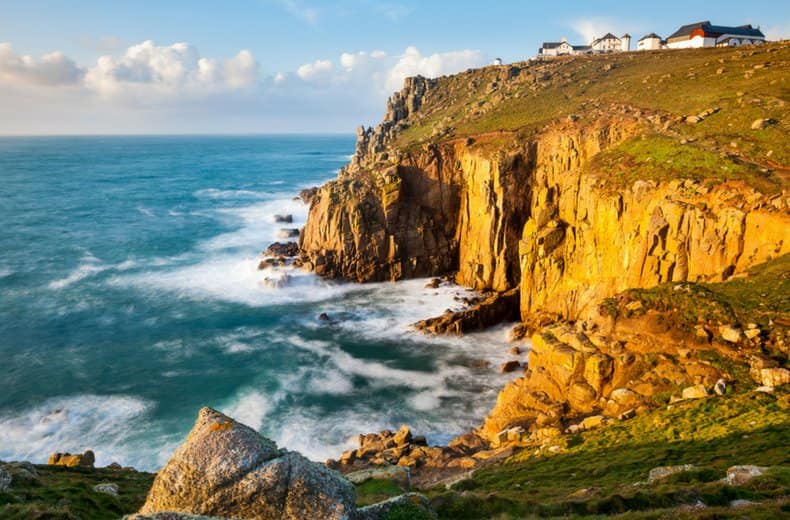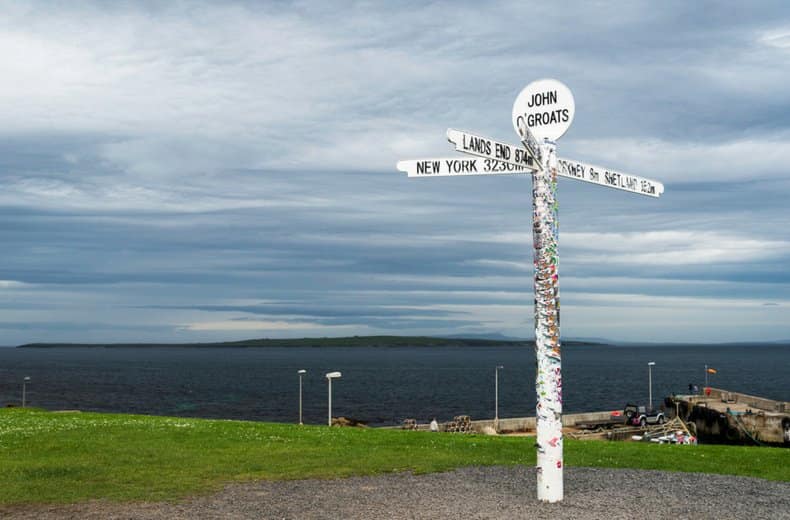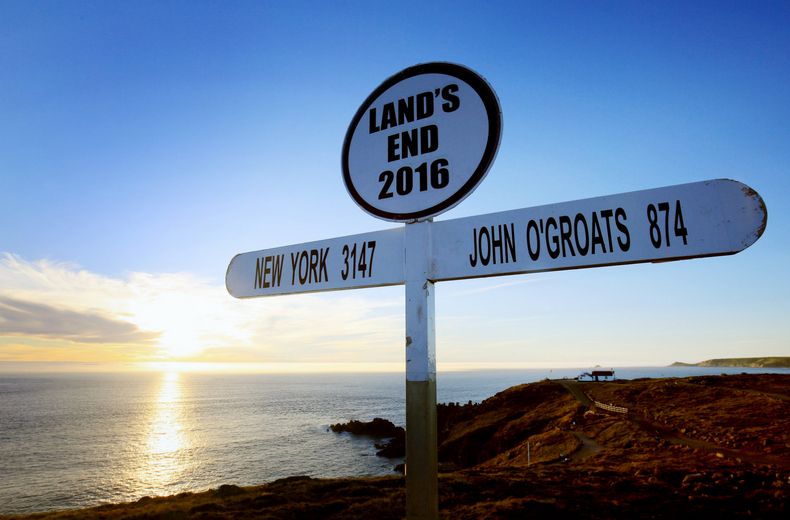Only after reading this essential guide to the UK’ s longest journey can even the most practical of drivers be prepared.
Buckle up, as we set out everything you need to know.
Are you experiencing a car fault, warning, or mechanical problem on your road trip? Find a local mechanic with the RAC.
Land’s End to John o’Groats: key stats
Sometimes known by its acronym, Le Jog, the journey from Land’s End to John o’Groats has a special place in the hearts of driving enthusiasts – whether as a bucket list ambition, charity endeavour or just a rewarding drive.
Land’s End is considered the most south-westerly point of the British Isles, at the end of west Cornwall’s Penwith peninsula. John o’Groats is acknowledged as the northern extreme of mainland Scotland, in Caithness.
The exact distance between the two points – and the most efficient way to travel between them – is a hotly-contested debate, but traditionally the famous journey was done in 874 miles.
As the crow flies, a straight-line between the two spans for just 603 miles, but unless you fancy taking a significant section of your trip through the Irish Sea, you should stick to actual roads.
How far is it?

Land's End - the start of the trip
The distance of the accepted road journey has fluctuated slightly as road layouts and mapping technology advances.
In 2011, online route planners estimated the quickest route on four wheels could be tackled in 15 hours, 48 minutes – taking in 838 miles of road.
This was taken a step further in 2017, when Google Maps calculated the fastest route by car as being 837 miles, taking 14 hours 40 minutes.
On a good day, the RAC says the 837-mile journey is possible in 14 hours, 30 minutes, although a journey of such distance is naturally susceptible to endless disruptions.
In terms of pure distance, the journey can be driven in around 814 miles if using numerous minor roads and utilising modern bridges.
This though, will take far more time than the commonly accepted ‘fastest route’.
READ MORE: How to avoid a summer breakdown
‘Le Jog’ – the most popular driving route
The route you choose will naturally depend on your purpose.
If you’re making an occasion out of this famous journey, have time to burn, and fancy a bit of exploration – your options are virtually endless.
If your only true aim is to get the drive done in the shortest time possible, you’ll be wanting to take the most obvious (sometimes called ‘the motorway route’) course.
Taking this approach means you can actually complete the trip in one (very long) day, although naturally you’ll need regular rest breaks.
Any longer detours that take you off course will require an overnight stop.
What is your fastest route?
As you’d expect from a drive that covers so much ground, the accepted journey route is a genuinely fascinating drive with heaps of scenery to admire.
In short, the approximate 14.5-hour journey incorporates 10 roads:
- A30 – Land’s End to Exeter
- M5 – Exeter to Birmingham
- M6 – Birmingham to Gretna Green
- A74 (M) – Gretna Green to Abington
- M74 – Abington to Glasgow
- M73 – Glasgow to Mollinsburn
- M80 – Mollinsburn to Nr. Bannockburn
- M9 – Nr. Bannockburn to Nr. Dunblane
- A9 – Nr. Dunblane to Latheron
- A99 – Latheron to John o’Groats
The two extremities themselves are not directly flanked by motorways, so you’ll enjoy scenic routes for both the first 120 miles (to Exeter) and the final 250 miles (north of Perth).
Journey planning is essential

As with any journey, the necessity to plan your route beforehand is crucial when attempting to tackle Land’s End to John o’Groats.
Try and factor in your stops beforehand.
Not only will you be able to seek out the cheapest by using apps like NextJunction you’ll give yourself tangible, journey legs at which you can reward yourself once reached.
Depending on your time of travel, it’s always advisable to include an overnight stop in your plans (or at least somewhere to rest your head for a few hours).
READ MORE: Six alternative stop-offs to the same old service stations this bank holiday
ALSO: Get cover from one hour to 30 days with RAC Temporary Car Insurance

Complete peace of mind for less
• Cheaper than AA Price Promise or your money back^
• We get to most breakdowns in 60 mins or less
• Our patrols fix 4/5 breakdowns on the spot

Planning alternative routes
Due to the sheer area of distance being covered, variations on the acknowledged route are endless.
Using smaller roads will add on lots of time, but allow for more scenic stop-offs in a huge variety of small country towns (Chard, Cirencester and Ludlow, to name but a few).
Maybe your goal is to complete the journey using exclusively A and B roads, no motorways allowed.
Perhaps you’re keen to decide on a theme for your trip, planning it to take in the greatest amount of old bridges, historic coaching routes… maybe towns beginning with N?
Any deviations from the accepted main route need to be properly planned – including pre-booked accommodation – and of course, all the usual road trip essentials.
Pre-journey checks
When putting your pride and joy through the rigours of any lengthy journey, it’s impossible to understate the importance of critical, pre-journey checks.
For starters, there’s those things you should be doing regularly anyway, such as checking your car’s oil levels and checking its lights and bulbs.
Ahead of a journey this size, it’s essential that you undertake some simple under-the-bonnet checks too, which will also help keep your vehicle in good shape and avoid extra costs on services and MOTs down the line.
Further to these, you should check your engine coolant before setting off, and also find out about how to check and replace your wiper blades.
For a journey of this length, peace-of-mind counts for a lot - so make sure you do all you can to ensure your vehicle doesn’t spoil what will be a memorable trip.
ALSO: RAC Motorbike Insurance - get cover online today.
Where should I stop off on the way?

So much of the main route provides opportunity to explore, depending on your time restraints.
Firstly there are the major towns and cities. The route takes you past, among others, Exeter, Bristol, Birmingham, Manchester, Liverpool and Glasgow – all fantastic places for a stop-off if you’re keen to get the most out of your tour.
Then there’s the National Parks. With a route that skirts Dartmoor, the Cotswolds, Yorkshire Dales, Lake District and Cairngorms – you’re treated to the very best of the Great British countryside.
No time for lengthy stop-offs? Fortunately, there are several scenic highlights that can be just as easily enjoyed from the car along this route, kicking off right at the beginning of the ride.
Must-see sights on the Land’s End to John o’Groats drive
As the M5 winds its way up to Exeter, you’re treated to a delicate path through the charming village of Sennen – before the road widens further north, allowing unparalleled views of the Exe Valley.
Despite being a motorway-heavy leg, the M5 south of Bristol is also a genuine highlight with its lush greenery and varied landscapes – before the run up to the M6 in the West Midlands.
As the M6 leads you past Manchester and towards the Lakes, the journey once again picks up in terms of its stunning surroundings.
From the Scottish border, the A74 (M) through Annandale all the way to Glasgow is also a sight to behold – just don’t expect too much in the way of radio signal in amongst this awesome, mountainous terrain.
Pay attention through the A80, M80, and M9 to the A9, with a flurry of relatively fast-paced road changes. That said, it’s a wonderful driving road, with some of Britain’s best landscapes, through the Cairngorms and Speyside.
Once you’ve traversed Inverness and the Black Isle, the A9 follows the east shore to Wick where you’ll pick up with the coast-clinging A99 – surely one of the most picturesque trails in the UK, taking you all the way to John O’Groats.
When you see the Orkney views, it’s a rewarding and fitting finale to your adventure.
READ MORE: Five roads that can't be ignored when holidaying in the UK
Buy an RAC Breakdown Assistance Kit today
Make sure you’re prepared for a breakdown and are kept safe at the roadside.







